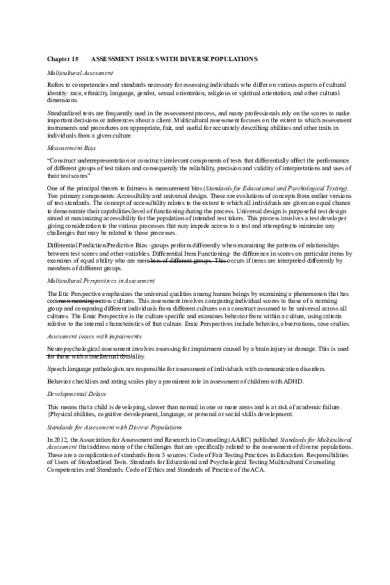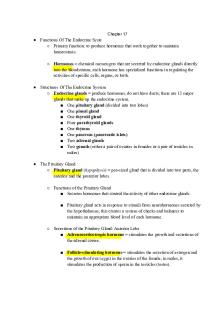Chapter 15 & 17 notes PDF

| Title | Chapter 15 & 17 notes |
|---|---|
| Author | Mary Bryn |
| Course | Evaluation and Assessment of Individual |
| Institution | Troy University |
| Pages | 2 |
| File Size | 98.5 KB |
| File Type | |
| Total Downloads | 70 |
| Total Views | 149 |
Summary
Key notes one page each for chapters 15 & 18...
Description
Chapter 15
ASSESSMENT ISSUES WITH DIVERSE POPULATIONS
Multicultural Assessment Refers to competencies and standards necessary for assessing individuals who differ on various aspects of cultural identity: race, ethnicity, language, gender, sexual orientation, religious or spiritual orientation, and other cultural dimensions. Standardized tests are frequently used in the assessment process, and many professionals rely on the scores to make important decisions or inferences about a client. Multicultural assessment focuses on the extent to which assessment instruments and procedures are appropriate, fair, and useful for accurately describing abilities and other traits in individuals from a given culture. Measurement Bias “Construct underrepresentation or construct-irrelevant components of tests that differentially affect the performance of different groups of test takers and consequently the reliability, precision and validity of interpretations and uses of their test scores” One of the principal threats to fairness is measurement bias (Standards for Educational and Psychological Testing). Two primary components: Accessibility and universal design. These are evolutions of concepts from earlier versions of test standards. The concept of accessibility relates to the extent to which all individuals are given an equal chance to demonstrate their capabilities/level of functioning during the process. Universal design is purposeful test design aimed at maximizing accessibility for the population of intended test takers. This process involves a test developer giving consideration to the various processes that may impede access to a test and attempting to minimize any challenges that may be related to those processes. Differential Prediction/Predictive Bias -groups perform differently when examining the patterns of relationships between test scores and other variables. Differential Item Functioning- the difference in scores on particular items by examines of equal ability who are members of different groups. This occurs if items are interpreted differently by members of different groups. Multicultural Perspectives in Assessment The Etic Perspective emphasizes the universal qualities among human beings by examining a phenomenon that has common meaning across cultures. This assessment involves comparing individual scores to those of a norming group and comparing different individuals from different cultures on a construct assumed to be universal across all cultures. The Emic Perspective is the culture specific and examines behavior from within a culture, using criteria relative to the internal characteristics of that culture. Emic Perspectives include behavior, observations, case studies. Assessment issues with impairments Neuropsychological assessment involves assessing for impairment caused by a brain injury or damage. This is used for those with a intellectual disability. Speech language pathologists are responsible for assessment of individuals with communication disorders. Behavior checklists and rating scales play a prominent role in assessment of children with ADHD. Developmental Delays This means that a child is developing, slower than normal in one or more areas and is at risk of academic failure. {Physical abilities, cognitive development, language, or personal or social skills development. Standards for Assessment with Diverse Populations In 2012, the Association for Assessment and Research in Counseling (AARC) published Standards for Multicultural Assessment that address many of the challenges that are specifically related to the assessment of diverse populations. These are a complication of standards from 5 sources: Code of Fair Testing Practices in Education. Responsibilities of Users of Standardized Tests. Standards for Educational and Psychological Testing Multicultural Counseling Competencies and Standards. Code of Ethics and Standards of Practice of the ACA.
Chapter 17
ETHICAL AND LEGAL ISSUES IN ASSESSMENT
Professional Standards ad Codes of Ethics Ethics can be viewed as moral principles adopted by an individual or group that provide the basis for right conduct. Several professional organizations have ethical standards related to assessment: American Counseling Association. American Educational Research Association, the American Psychological Association, Association for Assessment in Counseling. Joint Committee on Testing Practices. National Council on Measurement in Education. AERA, APA, and NCME Standards for Educational and Psychological Testing This is one of the most comprehensive documents on assessment standards (Standards for Educational and Psychological Testing). This represents the seventh in a series of publications that originated in 1954. It provides test developers and test users with assistance in evaluating the technical adequacy of their instruments for educational and psychological assessment. The intent is to promote the sound and ethical use of tests and to provide criteria for the evaluation of tests, testing practices, and the effects of test use. It is organized into 3 parts: Foundations, Operations, and Testing Applications. American Psychological Association Ethical Principles of Psychologists and Code of Conduct Consists of several ethical standards set forth as rules of conduct for psychologists. Section 9 specifically addresses 11 issues related to assessment. Association of Assessment and Research in Counseling Responsibilities of Users of Standardized Tests, 3 rd Edition This is an organization of counselors, counselor educators, and other professionals that provides leadership, training, and research in the creation, development, production, and use of assessment and diagnostic techniques in the counseling profession. They are responsible for developing the Responsibilities of Users of Standardized Tests which promotes the accurate, fair, and responsible use of standardized tests by the counseling and education communities. Ethical Issues in Assessment Professional Training and Competence – one of the most important ethical issues is the competency of the professional in the use of available assessment instruments. Test User Qualifications This refers to the necessary knowledge, skills, abilities, training, and credentials for using tests. There are classifications for test users: A Level, B Level, C Level Legal Issues in Assessment Not only ethical issues but also legal. Statutes- laws written by legislative bodies. Regulations- Laws created by government agencies. Judicial Decisions- Laws created by opinions from the court. Americans with Disabilites Act of 1990 Civil Rights Act of 1991 Family Educational RIgts and Privacy Act of 1974 Individuals with Disabilites Education Improvement Act of 2004 Judicial Decisions Laws created by opinions from the court, often in litigation cases. Most of the judicial decisions affecting assessment involve employment and educational tests....
Similar Free PDFs

Chapter 15 & 17 notes
- 2 Pages

Chapter 17 - Lecture notes 17
- 15 Pages

Chapter 17 - Lecture notes 17
- 7 Pages

R - Chapter 17 - notes
- 2 Pages

Chapter 17 notes
- 3 Pages

Chapter 17 Euro Notes
- 7 Pages

Chapter 17 Notes
- 8 Pages

Chapter 17 Review Notes
- 13 Pages

Chapter 17 Notes
- 5 Pages

Chapter 15 Notes
- 3 Pages

Chapter 15 Notes
- 9 Pages

Ch15 - Chapter 15 notes
- 7 Pages

Chapter 15 Evolution Notes
- 11 Pages

Comm Chapter 15 notes
- 6 Pages

Chapter 15 notes
- 9 Pages

Chapter 15 Notes
- 15 Pages
Popular Institutions
- Tinajero National High School - Annex
- Politeknik Caltex Riau
- Yokohama City University
- SGT University
- University of Al-Qadisiyah
- Divine Word College of Vigan
- Techniek College Rotterdam
- Universidade de Santiago
- Universiti Teknologi MARA Cawangan Johor Kampus Pasir Gudang
- Poltekkes Kemenkes Yogyakarta
- Baguio City National High School
- Colegio san marcos
- preparatoria uno
- Centro de Bachillerato Tecnológico Industrial y de Servicios No. 107
- Dalian Maritime University
- Quang Trung Secondary School
- Colegio Tecnológico en Informática
- Corporación Regional de Educación Superior
- Grupo CEDVA
- Dar Al Uloom University
- Centro de Estudios Preuniversitarios de la Universidad Nacional de Ingeniería
- 上智大学
- Aakash International School, Nuna Majara
- San Felipe Neri Catholic School
- Kang Chiao International School - New Taipei City
- Misamis Occidental National High School
- Institución Educativa Escuela Normal Juan Ladrilleros
- Kolehiyo ng Pantukan
- Batanes State College
- Instituto Continental
- Sekolah Menengah Kejuruan Kesehatan Kaltara (Tarakan)
- Colegio de La Inmaculada Concepcion - Cebu